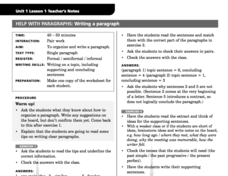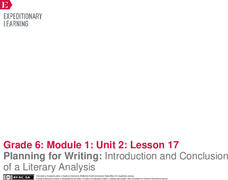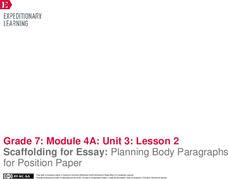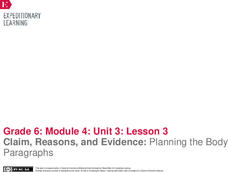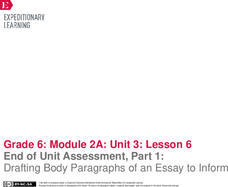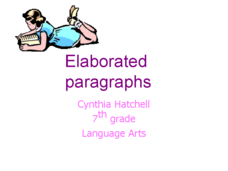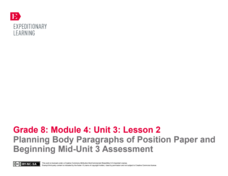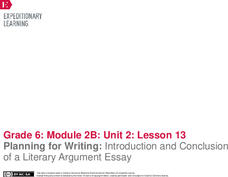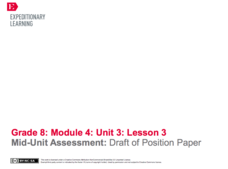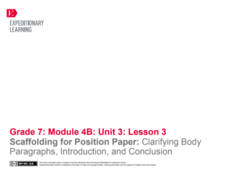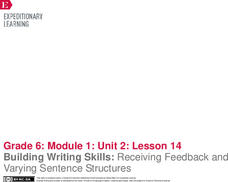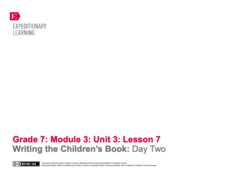Ohio Literacy Resource Center
Writing a Well-Structured Paragraph
Practice with paragraphs while thinking about careers! Learners examine and discuss two sample paragraphs, marking the different elements (topic sentences, body, concluding sentences), and try out writing their own paragraphs. Focusing...
Curated OER
Help With Paragraphs: Writing A Paragraph
Young scholars complete exercises to practice writing a paragraph. In this paragraph writing lesson plan, learners work in pairs to complete activities that require them to read sample paragraphs, organize sentences in sequence, and...
Curated OER
Connotation and Denotation: How Word Choice Affects a Paragraph
Review the terms denotation, connotation, diction, and mood in paragraph writing. After defining the terms, middle schoolers practice writing examples of both connotation and denotation. They complete a connotation and denotation graphic...
EngageNY
Planning for Writing: Introduction and Conclusion of a Literary Analysis
It's all about the introduction. Scholars work on the introductory paragraph for their essays, connecting the theme of a myth and The Lightning Thief. They use a graphic organizer to help focus their work and then move to working on the...
EngageNY
Scaffolding for Position Paper: Clarifying Body Paragraphs, Introduction, and Conclusion
All clear! Scholars read through the body paragraphs of their position papers to ensure clarity. They also review their planners to make sure all information is paraphrased without plagiarism. When satisfied with the body paragraphs,...
EngageNY
Scaffolding for Essay: Planning Body Paragraphs for Position Paper
Let's make a plan. Scholars work on the plan for their papers using a Position Paper Planner. They talk with a partner about counterclaims and think about counterclaims to include in their papers. As learners begin to write, they work...
Curated OER
Changing Seasons
Explore expository writing and using precise language in this descriptive paragraph writing lesson. Learners brainstorm prior knowledge about the changing seasons in Ohio. They describe seasonal items, view seasonal pictures from...
Curated OER
Writing Structure and Paragraph Lesson
Students review the correct form for writing paragraphs. In this paragraph writing lesson, students rewrite a poorly written opening sentence. Students make changes to a closing paragraph. Students write a plan for an essay of five...
EngageNY
Claim, Reasons, and Evidence: Planning the Body Paragraphs
Planning is the key to success. Scholars continue planning their essays by adding reasons to their Planning My Argument graphic organizers. Additionally, pupils analyze a body paragraph from a model position paper, identifying the...
EngageNY
End of Unit Assessment, Part 1: Drafting Body Paragraphs of an Essay to Inform
Anybody can write a body paragraph! Pupils analyze the development of ideas in a body paragraph from a model essay. Next, using what they've learned, they draft the body paragraphs of their My Rule to Live By informative essay.
Curated OER
Elaborated Paragraphs
Bright, bold, and engaging, this presentation on elaborated paragraphs is a good way to reinforce your expectations for your class's writing. Each slide presents a simple, straightforward tip to writing complete paragraphs, including...
EngageNY
Planning for Writing: Introduction and Conclusion of a Literary Analysis Essay
First and last impressions are important. Using the helpful resource, scholars draft the introductory and concluding paragraphs of their literary analysis essays. Next, they use a writing evaluation rubric to self-assess their work.
EngageNY
Mid-Unit Assessment: Completing My Draft Position Paper
What's the difference? Scholars analyze the similarities and differences between introductory and concluding paragraphs. Then, using a model essay as a guide, they write their draft position papers.
EngageNY
Writing: Drafting Body Paragraphs and Revising for Language
Begin the drafting phase of the writing process with a lesson plan focused on logically writing three body paragraphs. Then, revise the writing to make it more formal after a teacher-directed mini-lesson plan. Each paragraph highlights...
EngageNY
Planning Body Paragraphs of Position Paper and Beginning Mid-Unit 3 Assessment
The best sandwiches aren't always edible. Pupils use a Quote Sandwich graphic organizer to plan paragraphs two and three of their position papers about the best food chain. Next, they begin drafting their body paragraphs for the mid-unit...
EngageNY
Planning for Writing: Introduction and Conclusion of a Literary Argument Essay
Give a powerful introduction. Scholars analyze the introductory paragraph in the model essay "Are We Medieval?: Opportunities in the Middle Ages and Today." They discuss the key components the author includes and then walk through the...
EngageNY
Mid-Unit Assessment: Draft of Position Paper
What is the purpose of an introduction and conclusion? Using the resource, scholars review the model position paper from activity one and discuss the author's choices. Next, they draft their position papers' introductory and concluding...
EngageNY
Planning the Introductory and Concluding Paragraphs of the End of Unit Assessment Essay
Preparation is the key to success! Using the guiding resource, scholars plan their end-of-unit analytical essays' introductory and concluding paragraphs based on their reading of Inside Out & Back Again. To prepare, they complete a...
EngageNY
Scaffolding for Essay: Planning Body Paragraphs for Position Paper This work is licensed under a Creative Commons Attribution-NonCom
Scholars begin creating a plan for their position papers using a Sustainable Water Management Position Paper Planner. They talk with partners about their claims and counterclaims for the essays. Writers then work independently to plan...
EngageNY
Scaffolding for Position Paper: Clarifying Body Paragraphs, Introduction, and Conclusion
Let's have a talk. Scholars talk through the body paragraphs of their Sustainable Water Management position paper with peers. They take turns explaining their work to one another. They then begin to work independently on the introduction...
EngageNY
Building Writing Skills: Receiving Feedback and Varying Sentence Structures
Everyone is good at something. Scholars receive their mid-unit assessments with feedback. They look over their papers and write their strengths as a writer and goals on index cards. The class then has a mini lesson in using sentence...
EngageNY
End of Unit 2 Assessment, Part 2: Revise Essay Drafts
Time to revise! Scholars revise their argument essays based on Shakespeare's A Midsummer Night's Dream using feedback from their teacher and peers. They begin their revisions after reviewing a mini-instructional activity on proper...
EngageNY
Writing the Children’s Book: Day Two
Following a brief mini-lesson on using dialogue in fiction, young writers continue day two of their writing workshop. They work on the second half of their Children's Book Storyboards, and then they turn and talk with partners to reflect...
EngageNY
End of Unit 2 Assessment, Part 2: Revise Essay Drafts
Positive feedback is a great way to improve writers' skills. Scholars receive their draft essays back with teacher comments and start the revision process. Next, they prepare to begin their final drafts at home.



